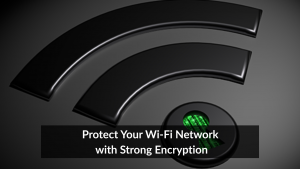
Your Wi-Fi network is the digital front door to your home or business. If it’s not secure, cybercriminals can slip in; stealing data, monitoring activity, or even launching attacks from your network.
The good news? With a few smart steps, you can lock down your Wi-Fi and keep intruders out.
Why Wi-Fi security matters
- Data protection: Sensitive emails, financial transactions, and business communications all travel through your network.
- Unauthorized access: Hackers can piggyback on weak networks to use your internet—or worse, infiltrate devices.
- Business risk: For companies, unsecured Wi-Fi can lead to compliance violations and costly breaches.
How to secure your Wi-Fi
- Enable WPA3 encryption: If your router supports it, WPA3 is the strongest standard available today. If not, WPA2 is the minimum.
- Use strong, unique passwords: Avoid default passwords or common phrases. A password manager (like we’ll cover in the next tip) can help.
- Change the SSID: Rename your Wi-Fi network from the factory default to something unique, but not personal (avoid names like “SmithFamilyWiFi”).
- Update router firmware: Just like computers, routers need updates for security patches.
- Limit guest access: Create a separate guest network to keep your main systems safe.
Extra tip for businesses
If your company offers employee or client Wi-Fi, consider deploying a secure enterprise Wi-Fi solution. These allow for stronger access controls, monitoring, and encryption.
How Common Knowledge can help
At Common Knowledge Technology, we help businesses set up secure, reliable networks that protect sensitive data and keep operations running smoothly.
Don’t let weak Wi-Fi be your weakest link.


